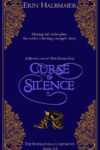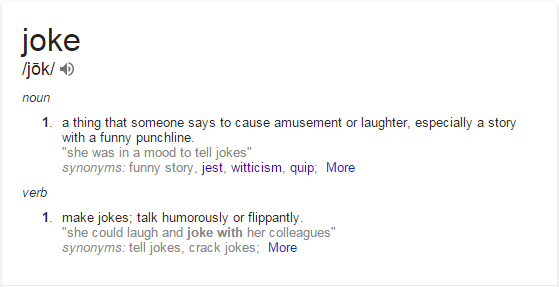Once, at a family get-together, I listened to a relative describe his wife’s process of becoming a naturalized US citizen. They would, he said, have to travel out of town for what he called our citizenship interview. The pronoun amused me, and I asked whether they would, if the interview went badly, take away his citizenship. He informed me, with all seriousness, that the interview was not about his citizenship, so I had to inform him with equal seriousness that I was joking. I felt clearly then – and I hold onto the judgment now – that the clarification should not have been necessary.
Now, I am not saying that he should have thought my remark was funny. But I think he should have been able to grasp that it was meant to be. As it was, I had to assure him that I didn’t really believe the United States government strips Americans of their citizenship on the provocation of a botched interview. Incidents like this raise a critical question: What are we to do with humorless people?
 The first impulse is usually to explain the joke to them. This impulse should in almost every circumstance be resisted. When you finish dissecting the humor of it for their enlightenment, it still will not be funny to them. At that point, it might not even be funny to you anymore. Jokes die of examination. Besides, laughter should be spontaneous, an involuntary reaction – like a sneeze. If you don’t get it more or less at once, you will never get it. The lifespan of jokes is to be measured in seconds, and it is best to let them die in peace.
The first impulse is usually to explain the joke to them. This impulse should in almost every circumstance be resisted. When you finish dissecting the humor of it for their enlightenment, it still will not be funny to them. At that point, it might not even be funny to you anymore. Jokes die of examination. Besides, laughter should be spontaneous, an involuntary reaction – like a sneeze. If you don’t get it more or less at once, you will never get it. The lifespan of jokes is to be measured in seconds, and it is best to let them die in peace.
Although jokes shouldn’t be explained, sometimes they do have to be declared. Depending upon the joke, people may rationally assume that if you are serious, you are dense, or strange, or sick. In such situations, it is necessary to alert people who take you seriously that you are joking. You’ll know them by the concerned looks on their faces. Just be sure that you keep the declaration brief and to the point. The people in question do not have to know why you are funny. They do not have to agree that you are funny. They only have to understand that you are trying to be.
Some people attempt to encourage a sense of humor. All sorts of arguments have been put forward in favor of humor, accompanied by the promise of benefits: better health, less stress, more happiness, etc. There are people who can expound, quite lucidly, on how a sense of humor can cushion the bumps and jostles on the long road of life. But if there is anything less conducive to humor than explanation, it is philosophy. People do not laugh because they think it would be good for them.
As you can see from this brief examination, we do not lack options in dealing with humorless people. What we lack is good options. As a parting thought, therefore, I leave you with the immortal observation of King Auberon in The Napoleon of Notting Hill: “In a world without humor, the only thing to do is to eat.”








































Hear hear! Eat… and drink! Although even that is less fun with people who have no sense of humor.
Well, just because someone didn’t get your joke doesn’t mean that they’re humorless.
I’ve been on both sides of this, honestly. Like, when I’m comfortable in a situation or get wound up I’ll make all kinds of jokes. Sometimes I have to explain those jokes, and even if I don’t like it, I understand that whether or not a joke is actually good, it’s meaning will not be obvious to everyone.
On the other hand, I’m highly introverted, and depending on what mode I’m stuck in, I won’t mind other people joking, but it will derail me and I won’t know how to respond. Sometimes this happens at work. I’ll be focused on my tasks and serious because I’m trying to be professional. Someone will joke with me. I know they’re joking. I might even think it’s funny, but sometimes I’ll respond seriously because I’m not in a laughing mood and can’t think of a good way to joke back. Or I realize that joking back could be a problem. There’s a little bit of truth in a lot of jokes, and sometimes people use jokes to find information in a polite or non combative way. Or, they can use it as an indirect way to communicate something. That is something people have to keep in mind when they answer.
But, no, my serious responses aren’t because I’m a humorless person. Serious as I am, I actually have a fun comedian mode that gets switched on sometimes. And no, not everyone gets my jokes. Certain jokes only work on certain people. When I’m around people that are experienced with computers, and they make a complaint about their Windows operating system, I can jokingly say ‘The virus called Microsoft’ and get a few chuckles. With other people, though, they might just feel a little confused. I’ve seen some people respond rather uncertainly to that joke, like ‘What…I have a virus…?’
What I usually do is evaluate ‘feedback’ like that to hone what type of jokes I make and when. I often will explain my jokes if need be. Unfortunately, if jokes fall flat and aren’t explained, too much is left open to interpretation. People might assume that the words ‘just kidding’ are a way to escape the social ramifications of what was said, rather than the genuine truth. Some people are amused after the joke is explained, but that isn’t the reason why I explain them. It’s usually just to prove I’m not unkind or weird.
How about:
“These are the jokes, folks. You are being watched; so you will laugh at them, whether you think they’re funny or not.”
The character Puddleglum from The Silver Chair was a chap without any sense of humor (even if he was himself unintentionally funny at times) but was a wonderful person. Eustace in The Voyage of the Dawn Treder thought he was delightfully funny (but wasn’t really) and was a terrible person.
C.S. Lewis nailed something important there I think. There’s something much more important about people, much more vital, than whether or not they have a sense of humor.
I wonder if your relative was/is actually a humorless person. Perhaps he was simply wrapped up with the seriousness of his wife’s naturalization. Or maybe he was concerned or worried about the outcome. Or maybe he was simply nervous about how much was at stake, and yet in the hands of a nameless government bureaucrat? Could it be that one of these frames of mind kept him from seeing the humor of your joke at that moment?
Also, for a husband to refer to something like this that affects the both of them, it is very common for him to use the plural inclusive pronoun. In his mind (and mine–I personally think and speak this way), the interview truly was his as well as hers, therefore ‘theirs.’